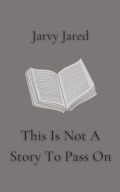Style Notes: This Is Not A Story To Pass On · 6:38pm Oct 13th, 2021
I have a few notes I wanted to share—things that I felt were important enough to share, because I believe in them, and I believe other writers might find them interesting. These are a bit disorganized, but I’ve tried to organize them in terms of content. I’ll try not to speak too long. Your time is valuable, as is mine.
Kabul fell on August 15, 2021. It came as both not a shock and a total shock. I expected it to happen the moment I learned we were pulling out of Afghanistan, but I didn’t expect it to happen so suddenly.
I’m from a generation where the Taliban was little more than the name of a shadow group and pseudo-government that I’d never seen, but whose crimes and collusions I’d heard in the wake of 9/11. As such I had no idea of where exactly in Afghanistan they were located - what they were doing after being effectively pushed aside. At best, I had framed them as an illusionary figure, an improper parody of a government of extremists. I had no sense of them being a “real threat,” for they were as distant from me geographically as philosophically. They had no real face. No real presence. My life, if I were to place it in this particular context, consisted only of the name, not the ones behind it.
Cold in Gardez wrote a blog post the day before talking about the situation, in a manner that was almost prophetic. When Kabul fell, the Taliban seemed more than real.
If memory serves, the fall of Kabul coincided with those videos of people running after a supply plane, hanging onto it, and then falling to their deaths. I was struck by that willingness to hold on to the plane even though there was no way they would survive the trip. In a flash of insight, I recalled photographs taken during 9/11 of people jumping from their floors to die on the ground, unwilling to let themselves burn to death. “The Falling Man,” taken by AP’s Richard Drew, came to mind.
In both scenarios, outside forces forced people to make impossible and deadly choices. And there were no happy endings. One had to choose between holding and falling, as it were, but is that really a choice if the outcome is still the same?
The month before, I’d been in the middle of writing a short story. I had three disparate paragraphs and that was it. No sense of character, plot, theme, or setting - no sense that this was going to be a story, really.
Something about these events, however, triggered me to get back to it. It seemed afterwards that the entire story wrote itself in only a few short weeks. I was not writing it so much as watching it be written, or hearing it as it was dictated to me by someone else. Perhaps one of those fallen, actually.
This context is only important in the sense that it’s what inspired me to write this story, and furthermore, to base it in applezombi’s Rekindled Embers universe. Having been a long fan of that story, I wanted to give something back to it, in the only way that I know—writing a story.
Of course, how one writes a story is a complicated and often unconscious process. Talking about the “how” feels a bit like a taboo, because I’m never sure if I know how a story comes to be. After all, one of the worst questions you can ask a writer is, “Where do you get your ideas?” Certainly, I can say Kabul, or Rekindled Embers, or even, “I got this one when I made a pretty crappy omelet one morning.”
Even so, there were some conscious decisions with this story. The most immediate was what tone of voice I wanted it to have.
An underrated aspect of writing is voice, I feel. While in most discussions we talk a lot about plot and character, very rarely, or at least, at infrequent intervals, do we talk simply about the “language” we want to use. Linguistic elements are incredibly vital to the presentation of a text: syntactical structure, tonal strategy, audibility— these contribute not just to how we read, but what we read, too.
When I start writing a story, if I have not already decided on a character or a subject, I am often going to consider first the voice of the piece. Sometimes it’s a question of who is telling the story. For, some stories are not told by their protagonists. Some are told by a disembodied narrator, who may or may not be the author themselves. Of course, frequently we also have stories told directly by the protagonist, either from the first-person or third-person limited perspective, and how the story is written reflects that effect. Thus, whoever tells the story, be that a character within in or without, determines the language, too.
For this particular story I wanted to blend between a “free indirect discourse” voice - which is just a way of saying, writing in a manner that resembles the diction of the character themselves - and a more open, “authorial” voice. You can see this as I have moved between Brimstone’s observations and then the more “narrative-driven” sections of the text. A lot of writers do this when they need to overcome the inherent limitations of a third-person limited perspective, and I felt that for a story steeped in this kind of tonal material, that was what I should do. Telling Brimstone’s story as Brimstone would tell it wasn’t enough; another presence needed to “back him up.”
This isn’t to say that the voice that predominantly carries throughout the story is either Brimstone’s or my own. As the only line of dialogue we see in “This Is Not A Story To Pass On” comes from an outsider and not the protagonist, we can’t exactly determine if when we have Brimstone making those observations, that that is his voice coming out. But we also can’t say that it’s mine. In most cases, the author’s voice fades as something else comes to inhabit that space. We call that thing the narrator, but the narrator is not always the author.
The effect, I believe, is one of poetry. These sentences have a habit of rolling out in full force, yet also with clear constraint and purpose. A few occasional lapses into stream-of-consciousness do occur, but I would attribute that mostly to whenever we move into Brimstone’s voice, and thus must bow to what encroaching madness haunts him. Otherwise, I tried to make each sentence sound clear and yet also be clear, stylistic choices notwithstanding. I believe I’ve managed to achieve that, but I also believe that a third or fourth read-through would have shown me where I might have let “poetic language” get in the way of concreteness.
Style isn’t perfect, though, and it changes with each story. My way of writing, say, “Gracefully” or “Maud Slam,” differs greatly from what I have here, and were I to pinpoint a particular story that may have a similar style, I’d say it might be “The Pilgrimage.” At least there you see me experimenting with the long-sentence form, but in a less than stellar fashion. I was emulating unimpressively and awkwardly. I’d like to think I did a better job with it here.
I was influenced, in large part, by the work of Gabriel Garcia Marquez, whose writing is incredibly dense and yet enormously beautiful. This story’s first line was inspired by one of his novels, The Autumn of the Patriarch, whose first sentence reads as follows:
Over the weekend the vultures got into the Presidential Palace by pecking through the screens on the balcony windows, and the flapping of their wings stirred up the stagnant time inside, and at dawn on Monday the city awoke out of its lethargy of centuries with the warm, soft breeze of a great man dead and rotting grandeur.
I believe, however, I might also have been inspired by his “Chronicle of a Death Foretold,” only in the sense that that story and this one speak of death in terms of inevitability. Brimstone knows his time is up, and by the end of the story it’s clear how it’ll all end (even if the context, without reading Rekindled Embers, is muddled). But upon reflection, I also think I was inspired by what I saw from Kabul—the inevitability of chaos, of death, of destruction. These are dark and sinister topics, but I felt they could be examined through a story such as this, even if nothing would connect the one with the other. The fictitious lives of ponies rarely intersect with the very real, very tragic lives and deaths of strangers in strange lands. Yet that juxtaposition, of one thing against the other, creating an antithesis between the two—that felt too compelling not to write.
It would appear that antithesis informs this story, too. Light and dark intertwine and mingle in the same spaces that summer and winter do. Memory and forgetting pair up and cancel out. Brimstone himself is a kind of living antithesis, filled with contradictions—when he talks about himself containing multitudes, that is taken from a section of Walt Whitman’s incredible “Leaves of Grass,” a poem that, among other things, talks about how contradictions fill our everyday lives.
The last example of antithesis comes from the title. I borrowed it from a line from Toni Morrison’s amazing Beloved. The last chapter of that book repeats that line—I have endeavored to pay homage by doing something similarly with how this story ends. But, it is an antithesis. It’s a paradox. For if this is a story not to pass on, why is it being read, now? And why or how can I write it, if it was not meant to pass through to me, the writer, then from me, onto you, the reader?
“This Is Not A Story To Pass On,” passes on anyway. Perhaps that is good. Perhaps there’s some hope in that. Brimstone is dead, sure, and his story will be forgotten, but we won’t forget it or him.
I don’t think I did all of this consciously, at least not with the story’s first draft. But further drafts have allowed me to pinpoint the above techniques and strategies to bring to life a truly unique tale. That tends to be how editing works—not fixing mistakes, but making a story more concrete and hold more weight—turning a patchwork pattern into an actual tapestry.
I have held that writing is often guided by instinct more than logic, but there is and always will be a kind of logic to every story. I believe it is the writer’s job to try and tie that logic together in order to render the story in the fullest way possible. I hope it is not arrogant of me to say: I believe I have done so quite nicely with this story.
And, I hope it isn’t considered self-indulgent to speak of style and of story in this way, or speak of both in the first place. I find that writers rarely get a chance to talk about their work, not because no one affords them it, but because they rarely permit themselves. Perhaps that’s because there is this sense that you shouldn’t talk so openly about something so “sacred.” But I think it’s important that we do reflect upon every story we write. We learn a little each time.
Thank you for reading!



